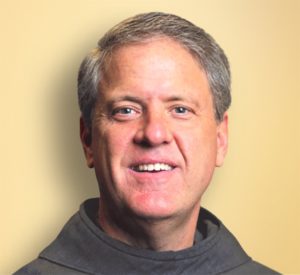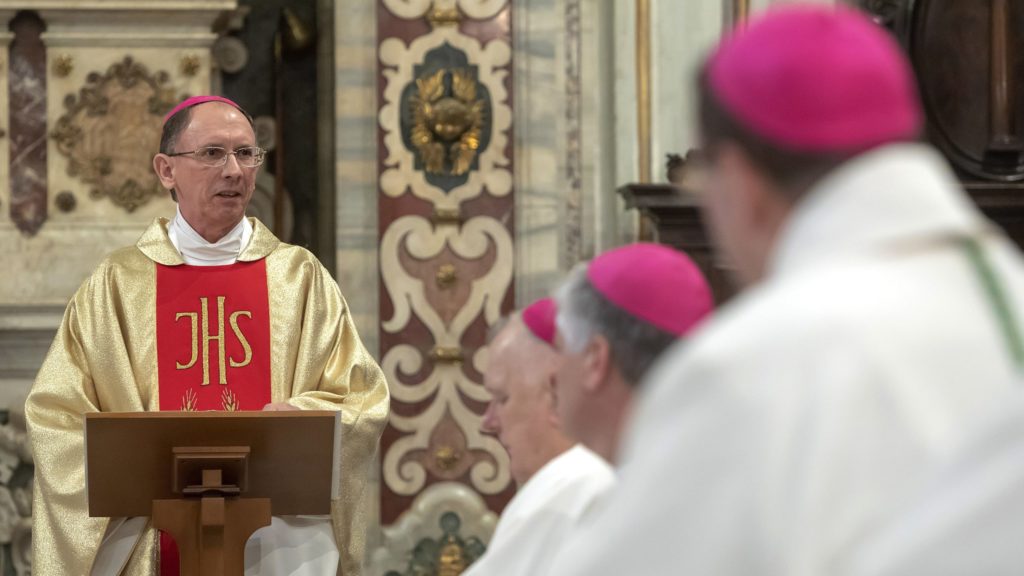Pope Francis has accepted the resignation of Bishop Peter J. Jugis, 67, from the pastoral governance of the Diocese of Charlotte, North Carolina, for health reasons and appointed Conventual Franciscan Father Michael T. Martin, 62, as his successor.
Bishop Jugis, who has headed the diocese since 2003, is 67, eight years younger than the age at which canon law requires bishops to submit their resignation to the pope. A native of Charlotte, he was appointed the fourth bishop of the diocese by St. John Paul II Aug. 1, 2003. He was ordained a bishop and installed as Charlotte's shepherd Oct. 24, 2003.

A Baltimore native, Bishop-designate Martin is a member of the Conventual Franciscan Province of Our Lady of the Angels, based in Ellicott City, Maryland, and currently serves as pastor at St. Philip Benizi Church in Jonesboro, Georgia.
The resignation and appointment were publicized in Washington April 9 by Cardinal Christophe Pierre, apostolic nuncio to the United States. The changes were announced in Charlotte.
Bishop-designate Martin will be ordained and installed as the fifth bishop of Charlotte May 29 at St. Mark Catholic Church in Huntersville, North Carolina.
Bishop Jugis submitted his request for retirement to Rome last June, saying a chronic but non-life-threatening kidney condition made it difficult for him to preside over lengthy liturgies and travel across the 46 counties of the expansive diocese.
Bishop Jugis recently celebrated his 20th anniversary as bishop and 40th anniversary as a priest. He will serve as administrator of the diocese until May when Bishop-designate Martin is installed, then will continue to assist the diocese as bishop emeritus.
Bishop-designate Martin has deep roots in Catholic education -- having served as a teacher, coach and school administrator in Baltimore, New York and Durham -- and arrives at a time of record enrollment in the Diocese of Charlotte's 20 schools.
"I am amazed and humbled that the Holy Father has faith in me to call me to serve the people of Western North Carolina," he said in a statement. "I am excited to get to know you and to listen to the ways in which together we can respond to the call of the Holy Spirit to be disciples of Jesus."
The newly named bishop was born in Baltimore Dec. 2, 1961, the only boy of four children in a Catholic family whose faith was an integral part of their lives. He attended Archbishop Curley High School in Baltimore, where he would later return to work. In 1979, when he was 17, he entered the Conventual Franciscan Friars Novitiate in Ellicott City.
He graduated with a bachelor's degree in philosophy from St. Hyacinth College-Seminary in Massachusetts, earned a bachelor of sacred theology from the Pontifical University of St. Bonaventure in Rome and received a master's degree in education from Boston College.
He worked as a religious studies teacher and coach at St. Francis High School in Athol Springs, New York, in 1984-85, then served as a transitional deacon at St. Adalbert Parish in Elmhurst, New York, in 1988-1989.
He was ordained to the priesthood June 10, 1989, by then Auxiliary Bishop John H. Ricard of Baltimore during a Mass at St. Casimir Catholic Church in Baltimore.
Following his ordination, he returned to St. Francis High School to serve as admissions director and a teacher and coach, from 1989 to 1994. He then served in several positions at his alma mater Archbishop Curley High School from 1994 to 2010 -- including president, principal, admissions director, and teacher and basketball coach.
Bishop-designate Martin is no stranger to North Carolina, having served as director of the Duke Catholic Center -- the official Catholic community at Duke University in Durham -- from 2010 to 2022. The center serves and supports a Catholic student population that is the largest single faith community on campus, about 2,500 students.
He also has held a number of leadership positions in the church, particularly in Catholic education. He has served on multiple Catholic school boards including Cardinal Gibbons High School in Raleigh, North Carolina, and worked with Partners in Mission, a Boston-based consulting firm that partners with Catholic schools and institutions to advance the mission of Catholic education.
In 2022, his order assigned him to ministry in the Archdiocese of Atlanta, where he has been pastor of St. Philip Benizi in Jonesboro.
Atlanta Archbishop Gregory J. Hartmayer, also a Conventual Franciscan, said Bishop-designate Martin is a devoted priest and will be a wonderful shepherd for the Diocese of Charlotte.
"I believe Pope Francis has made an excellent choice for the Church of Charlotte," said the archbishop, who also leads the Catholic Church's three-state province of Georgia and the Carolinas. The newly named bishop "is a man who is deeply in love with Jesus, and he is a faithful son of St. Francis of Assisi," the archbishop said in a statement.
"He comes to the Diocese of Charlotte with many gifts and a wealth of experience, and a love for God's people. I believe he will be a bishop who listens and leads," he added.
Bishop Jugis said it has been a delight to meet and talk with his future successor.
"As difficult as it is for me to leave this position that I love, I am confident that God has a plan in bringing us Bishop-elect Martin, and I will do everything I can to support his ministry," he said.
"It has truly been the joy of a lifetime to serve as bishop for the people of our diocese," he continued, "and I believe Bishop-elect Martin will find that to be true for him as he gets to know the faithful of our diocese and sees firsthand our many ministries that are dedicated to sharing the love of Christ in our communities."
Over the past 20 years, Bishop Jugis has led the diocese through unprecedented growth, particularly in its vocations program and schools.
During his tenure, he has called to holy orders 57 new priests and 65 new permanent deacons for ministry, and established six new parishes. In 2016 he founded St. Joseph College Seminary in Mount Holly to form priests for the diocese from among the parishes they will one day serve. He has overseen rapid growth at the diocese's 20 accredited schools, which this year saw a record enrollment that topped 8,100 students.
He established the annual Eucharistic congress in 2005, one of the largest public worship events of its kind in the United States, drawing more than 10,000 people to Charlotte each fall to celebrate the Catholic faith.
The Diocese of Charlotte covers 20,470 square miles in the state of North Carolina, and has 546,370 Catholics out of a total population of more than 5.5 million.

